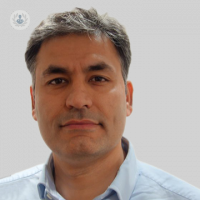What are the first signs of a spinal tumour?
Written by:A spinal tumour is an abnormal growth of cells that start within the spinal column and/or the structures within it, such as the spinal cord.
Here, Dr Waqar Saleem, renowned consultant clinical oncologist, provides an expert insight into spinal tumours. The London-based specialist discusses the types, the causes and the surgical treatment for spinal tumours, among other important points.

Are all spinal tumours cancerous?
When we talk about spinal tumours, we are talking about their nature: some of them are benign; some of them are clearly malignant; and some of them are in between, meaning that they have the potential to transform.
So, no, not all spinal tumours are cancerous, but many of them are.
What are the chances a spinal tumour could cause death or disability?
Spinal tumours themselves very rarely are the direct cause of death, but they very commonly cause severe disability and morbidity.
Most people are probably familiar with the paralysis that spinal tumours cause, which is a very big disability in which you are unable to move all, or part, of your body. Paralysis affects your ability to walk around, and when you lose this ability, this is a pre-cursor to several other complications that can settle over time.
However, it is very uncommon for somebody to die directly as a result of a spinal tumour.
What causes spinal tumours?
There are a number of different spinal tumours, and they all have different causes.
In my case, one of the commonest tumours that I deal with are secondary spinal tumours. These are secondary deposits in the spine from a primary cancer elsewhere, such as lung cancer, breast cancer or colon cancer. These are, by far, the commonest kind of tumours that I see. In fact, even in this day and age, unfortunately a very high number of patients present with spinal tumours as their first presentation of cancer, meaning that they didn’t know they had cancer before, and this is when they come to find out.
A very small number of spinal tumours are familial, and they usually tend to be more on the benign end. However, by and large, it is very difficult to say why somebody has developed a cancer or a spinal tumour, indeed.
Are spinal tumours painful?
If a spinal tumour has caused damage to the surrounding bone, it can cause pain. If a spinal tumour is pressing on a nerve, it can also be very painful. So, yes, spinal tumours can be painful.
However, equally, spinal tumours can be relatively silent in terms of symptoms.
How is surgery for spinal tumours performed?
The first question a surgeon must answer is, “Do I think that I am dealing with a benign tumour or do I think that I am dealing with a malignant tumour?”. By and large, spinal tumour surgery is performed under general anaesthetic, but the extent of the surgery and the aim of surgery will be different depending on the type of tumour.
So, most spinal tumour surgeries will, in the UK, be performed by a multidisciplinary team. This will involve the input of a specialist spinal surgeon who specialises in the management of spinal tumours, a neuro-oncologist such as myself, a neuropathologist, and a radiologist, to sit down and discuss the optimal approach for the tumour.
Dr Waqar Saleem is a highly skilled consultant clinical oncologist with over 20 years’ experience.
If you require expert treatment and management for a spinal tumour, do not hesitate to book an appointment with Dr Saleem via his Top Doctors profile today.



